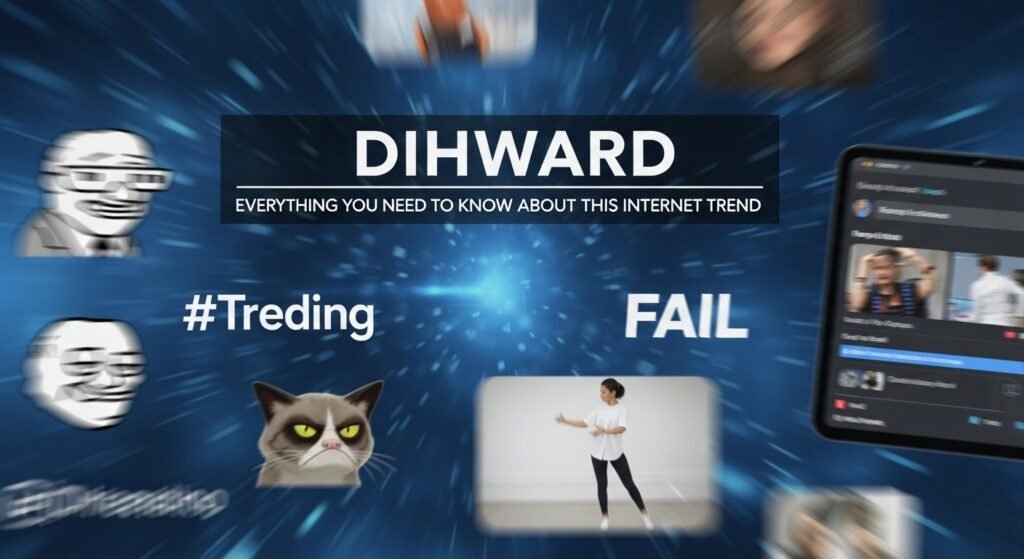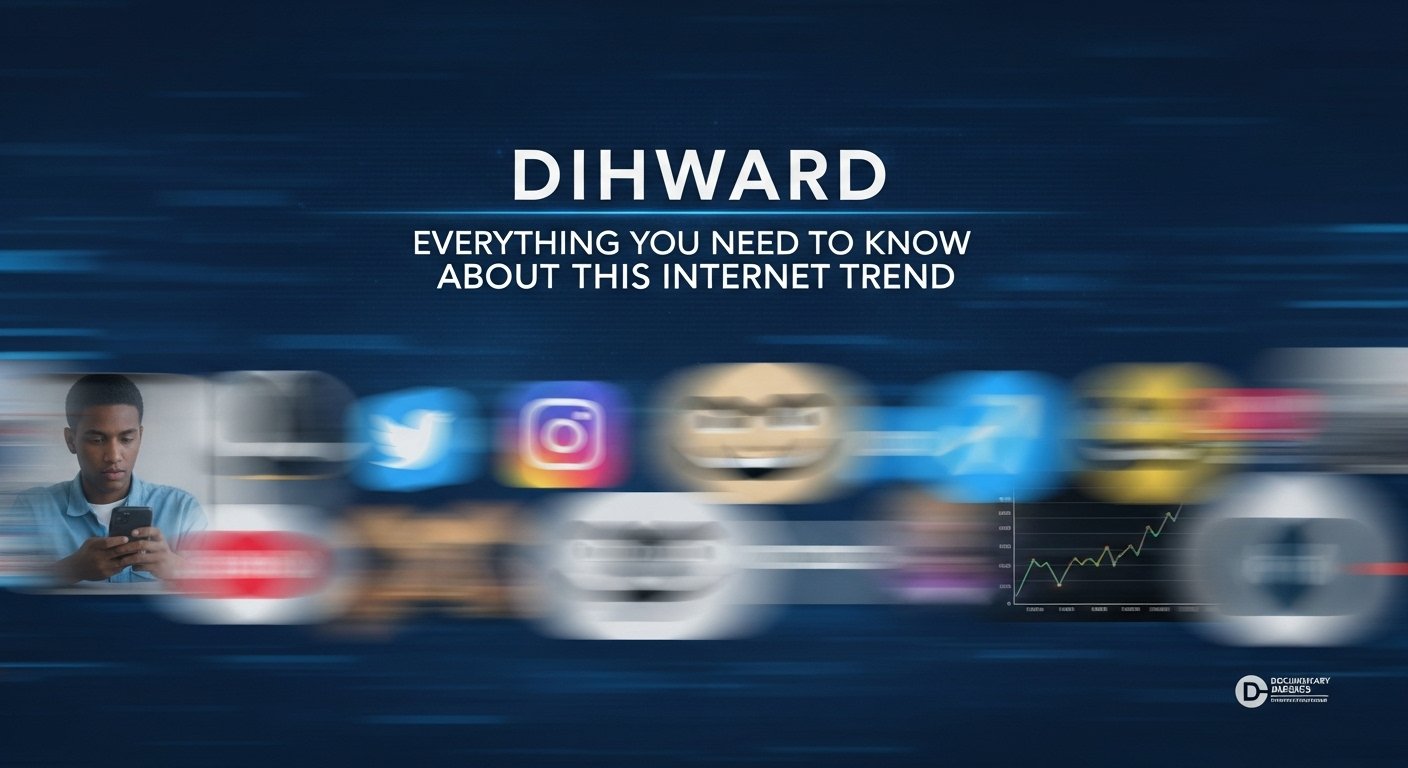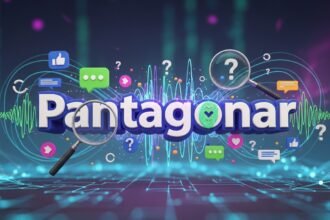Introduction
If you’ve been scrolling through social media, watching TikToks, or browsing meme forums, there’s a good chance you’ve come across the word dihward and thought, “What is that?” You’re not alone! The word “dihward” has popped up across the internet and sparked a lot of confusion—and curiosity. It sounds funny, looks mysterious, and often appears in comments or jokes. But what does it mean? Is it a meme, a game, a person, or an inside joke? The answer depends on where it’s used and who’s using it. In this simple, fun, and helpful guide, we’ll explore what dihward really is, where it came from, and why it’s trending. Prepare to dive into one of the internet’s latest and weirdest obsessions.
What Does Dihward Mean?
Let’s start with the big question: What does dihward actually mean? The truth is—it doesn’t have one fixed definition. Dihward is more of a made-up or internet-born term that started as a joke or random trend, but it’s picked up steam online. It’s often used like a meme or inside joke—something random that people post to confuse or make others laugh. In many posts, dihward doesn’t have context, which makes it more mysterious or funny to some people. Think of it as one of those silly internet phrases, like “Skibidi” or “Gyatt,” that becomes popular because it sounds strange or funny, not because it means something deep.
Where Did the Dihward Trend Start?
Most people trace the dihward trend back to platforms like TikTok, Reddit, or Discord. These places are known for starting viral moments and internet slang. While nobody knows exactly who invented the word, it likely began as someone’s playful randomness. It may have been used in a meme, a misleading comment, or a funny edit. Sometimes, users purposely create odd words like “dihward” and repeat them to see if others will copy them. Then one person shares it, another jokes about it, and suddenly it’s everywhere. That’s how internet trends work, and dihward is no different—it came from nothing and somehow turned into something.
How Do People Use Dihward in Conversations?
Using dihward in online chats or social media is part of the fun. Because it’s a mysterious or undefined word, people use it to troll, confuse, or make others laugh. Someone might reply “dihward” in a serious conversation just to be random. Others might mix it into song lyrics, spam it in comment sections, or use it in meme captions. Dihward is usually used in a way that makes no sense—and that’s the point. Its randomness makes it funnier. Some people also use it like a “bait-and-switch” meme, where the setup looks serious or emotional, but the punchline is just… “dihward.”
Is Dihward a Meme, a Word, or Just Noise?
It might sound confusing, but dihward is all three—it’s a meme, a nonsensical word, and random online noise. It doesn’t follow formal grammar or spelling rules. It’s like a modern internet version of inside jokes where only frequent users understand. It’s not in dictionaries, and you won’t see it in school books, but you’ll definitely find it all over meme pages, TikTok comments, and Discord servers. That’s what makes it so iconic. Its very lack of meaning is what gives it its power. It’s a blank slate—people give it whatever meaning or use they like based on mood and humor.
Why Do Teenagers Love Saying Dihward?
Teens love dihward because it fits the current trend of abstract internet humor. Remember when “ligma” or “deez nuts” went viral? Dihward is similar—it sounds silly, might confuse newer internet users, and feels like being part of an exclusive club. Teens enjoy being in on a joke that parents, teachers, or non-Gen Z users might not understand. Sometimes, saying dihward is just a way to mess around or make a friend laugh during class. It’s pointless—but that’s the joke. The less it means, the more fun people seem to have with it.
Can Dihward Be Offensive?
As of now, there’s no solid evidence that dihward is offensive. Most uses of the word are harmless and intended as silly fun. That said, some people use it in a way that mimics words or phrases meant to trick others—like baiting people into reading a silly or fake phrase out loud. So, while it’s not offensive by definition, it’s good to be mindful. Just like with any online trend, how you use it matters. If you’re using dihward in a friendly or funny way to joke with friends, it’s usually fine. But as a rule of thumb, never use memes or slang to embarrass or harm someone.
Real-Life Examples of the Dihward Trend

Let’s talk about some funny real-life things people have done with dihward. On TikTok, creators post skits with dramatic music, and right at the end, a quiet voice says, “dihward,” breaking the mood and leaving people laughing. On Discord servers, some users create “dihward bots” that respond with the word randomly when triggered. On YouTube, you’ll find edits or slideshows ending with “dihward” as the final word—making the whole video feel like a prank. My younger cousin once named his Minecraft world “Dihward Kingdom.” He had no reason—just thought it was funny. That’s the charm. Dihward doesn’t need a reason—it just exists.
Is Dihward a Modern Internet Culture Symbol?
Strangely, yes. Even though dihward started as a joke, it now reflects something deeper about internet culture. It shows how a meaningless word can spread across platforms and become part of our everyday online talk. These small, random trends are the heart of how online communities interact. From TikTok trends to viral tweets, internet humor keeps changing—and dihward is just one example of how playful and creative people are online every day. It also proves that not everything needs to have meaning to bring people together. Sometimes, weird words like dihward make a normal day fun just by being silly.
Internet Trends Like Dihward That Went Viral
Before dihward, there were plenty of random internet trends that followed a similar path. You might remember terms like “bing chilling,” “sussy baka,” “Gyatt,” or “Skibidi.” These words exploded across TikTok, YouTube, and Instagram just like dihward. Some lasted a few days. Others stayed around for months. Most of them didn’t mean much but were repeated so often, they became part of the internet’s shared language. Dihward is walking that same viral path. It might fade soon—or stay in circulation like a classic inside joke. That’s what makes it fun—you never know how long it’ll stick around.
Should Parents and Teachers Know About Dihward?
While dihward isn’t harmful, parents and teachers might still be confused when they hear kids say it. And that’s understandable! If your child suddenly yells “dihward!” at the dinner table or writes it in a notebook, it might seem strange. But know this—it’s just playful internet humor. You don’t need to worry. Being aware of internet slang like dihward can actually help adults connect better with kids. Ask them what it means, and they’ll probably laugh and say, “It means nothing!”—which leads to a fun conversation. Knowing these trends helps bridge the gap between generations without ruining the joke.
How Long Will the Dihward Trend Last?
Like many viral internet words, the dihward trend may not last forever. These things often come and go quickly. But sometimes, they stay alive in joke circles, Discord servers, or meme history. Think of it like a digital inside joke that never fully dies. Even if it fades from TikTok For You pages, people might still sneak it into comments or games for fun. Will dihward become a permanent meme word? No one can say. But while it’s here, it’s getting laughs, confusing grown-ups, and spreading across phones and screens. And that’s the fun of internet trends—they’re unexpected and wildly entertaining.
FAQs
Q1: What does dihward actually mean?
Dihward doesn’t have a real meaning. It’s a random internet word used for humor and memes online.
Q2: Where did the word dihward come from?
Dihward likely started on social platforms like Discord or TikTok. Its exact origin is unknown.
Q3: Is dihward a person or character?
No, dihward isn’t a known person or character. It’s just a made-up word used in internet jokes.
Q4: Can saying dihward be offensive?
Not normally. It’s usually just silly and harmless, but it depends on the context like any joke.
Q5: How are people using dihward on social media?
Using it in random comments, memes, or as a surprise at the end of videos is very popular.
Q6: Is dihward here to stay?
It’s unclear. Like most internet trends, it may fade or become a lasting meme within online communities.
Conclusion
So, what is dihward really? It’s weird. It’s funny. It’s random. And that’s why people love it. In a world full of serious things, sometimes a silly word like dihward is exactly what people need for a laugh. Whether you see it in comments, hear it from a friend, or spot it in a meme, it’s just part of today’s online fun. Dihward might have no meaning, but that’s what gives it its power—it brings people together just by being unexpected. So the next time someone says dihward, don’t be confused. Just smile. You’re part of the joke now.






